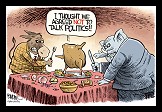Court's decision on whether to hear a challenge to the Wisconsin GOP's 'unconstitutional' voting restriction is a moment of truth for democracy...
 As we find ourselves smack dab on the 50th anniversary of the Bloody Sunday march for voting rights in Selma, Alabama, there are some key decisions from the U.S. Supreme Court, coming very soon, which may well determine whether millions of otherwise lawfully registered and disproportionately Democratic-leaning African-American and Hispanic voters will be prevented from voting in the 2016 elections.
As we find ourselves smack dab on the 50th anniversary of the Bloody Sunday march for voting rights in Selma, Alabama, there are some key decisions from the U.S. Supreme Court, coming very soon, which may well determine whether millions of otherwise lawfully registered and disproportionately Democratic-leaning African-American and Hispanic voters will be prevented from voting in the 2016 elections.
The decision that emerges from the Supreme Court's March 20, 2015 Conference in the Wisconsin polling place photo ID case, Frank v. Walker, could well be dispositive in that regard. It also may be the last chance to avoid the legal chaos that plagued the 2014 elections, during which similar voting restrictions, in state-after-state, were implemented, struck down, restored, or, with respect to Wisconsin, blocked again. Where, last year, the Court's eleventh hour decisions preserved the right to vote in Wisconsin, that same Supreme Court, on the eve of the 2014 mid-term, eliminated the right to vote for hundreds of thousands of predominantly African-American and Hispanic voters in Texas and North Carolina. The failure of the Supreme Court to take up the issue now could produce an even darker cloud of doubt over the integrity and legitimacy of the 2016 Presidential Election.
The immediate issue now before the Court is not whether SCOTUS agrees with a U.S. District Court judge and half the judges on the 7th Circuit Court of Appeal that WI's law (aka Act 23) is both unconstitutional and violative of Section 2 of the Voting Rights Act. As those judge found, Act 23, if implemented in the Badger State, could disenfranchise more than 300,000 lawfully registered Wisconsin voters.
Rather, the immediate issue at the March 20 Conference is whether the Supremes will grant an ACLU petition for a writ of certiorari (aka "cert petition") and schedule oral arguments on the Constitutionality of the Republican-enacted law. Or whether, as urged by the attorneys representing WI's Republican Governor Scott Walker, the Court will defer its decision until similar legal challenges to strict photo ID laws in other states, such as North Carolina and Texas, wind their way through the trial and appellate courts.
In other words, do they hear the Wisconsin case now, as urged by the ACLU and other voting rights advocates? Or do they wait to combine the matter with several other challenges to substantively identical voting restrictions implemented by Republicans in other states, as urged by one of the men who stands to benefit from delaying such a decision as long as possible?
That decision whether to hear the case now, rather than later, may well have a huge impact on who will serve as the next President of the United States...
--- Click here for REST OF STORY!... ---



 Sunday 'No Such Agreement' Toons
Sunday 'No Such Agreement' Toons How (and Why!) to 'Extend an Olive Branch' to MAGA Family Members Over the Holidays: 'BradCast' 11/21/24
How (and Why!) to 'Extend an Olive Branch' to MAGA Family Members Over the Holidays: 'BradCast' 11/21/24 'Green News Report' 11/21/24
'Green News Report' 11/21/24
 Former Federal Prosecutor: Trump Must Be Sentenced in NY Before Taking Office Again: 'BradCast' 11/20/24
Former Federal Prosecutor: Trump Must Be Sentenced in NY Before Taking Office Again: 'BradCast' 11/20/24 'Bullet Ballot' Claims, Other Arguments for Hand-Counting 2024 Battleground Votes: 'BradCast' 11/19/24
'Bullet Ballot' Claims, Other Arguments for Hand-Counting 2024 Battleground Votes: 'BradCast' 11/19/24 'Green News Report' 11/19/24
'Green News Report' 11/19/24 Trump Already Violating Law (He Signed!) During Transition: 'BradCast' 11/18/24
Trump Already Violating Law (He Signed!) During Transition: 'BradCast' 11/18/24 Sunday 'Into the Gaetz of Hell' Toons
Sunday 'Into the Gaetz of Hell' Toons Computer Security Experts Ask Harris to Seek Hand-Counts Due to Voting System Breaches: 'BradCast' 11/14/24
Computer Security Experts Ask Harris to Seek Hand-Counts Due to Voting System Breaches: 'BradCast' 11/14/24 'Green News Report' 11/14/24
'Green News Report' 11/14/24 Trump Criminal Cases Fade, as GOP 'Does Not Believe in Rule of Law': 'BradCast' 11/13/24
Trump Criminal Cases Fade, as GOP 'Does Not Believe in Rule of Law': 'BradCast' 11/13/24 Climate Advocates Brace for Fight With Trump 2.0: 'BradCast' 11/12/24
Climate Advocates Brace for Fight With Trump 2.0: 'BradCast' 11/12/24 Let It All Out: 'BradCast' 11/11/24
Let It All Out: 'BradCast' 11/11/24 Not All Bad: Abortion Rights Won Big (Almost) Everywhere: 'BradCast' 11/7/24
Not All Bad: Abortion Rights Won Big (Almost) Everywhere: 'BradCast' 11/7/24 U.S. CHOOSES CONVICTED CRIMINAL, ADJUDICATED RAPIST: 'BradCast' 11/6/24
U.S. CHOOSES CONVICTED CRIMINAL, ADJUDICATED RAPIST: 'BradCast' 11/6/24 ELECTION DAY 2024: Tea Leaves, Probs for Voters, What's Next: 'BradCast' 11/5/24
ELECTION DAY 2024: Tea Leaves, Probs for Voters, What's Next: 'BradCast' 11/5/24 'Closing Arguments' for Undecideds, Third-Party Voters: 'BradCast' 11/4/24
'Closing Arguments' for Undecideds, Third-Party Voters: 'BradCast' 11/4/24 The GOP 'Voter Fraud' Before the Storm: 'BradCast' 10/31/24
The GOP 'Voter Fraud' Before the Storm: 'BradCast' 10/31/24
 VA GOP VOTER REG FRAUDSTER OFF HOOK
VA GOP VOTER REG FRAUDSTER OFF HOOK Criminal GOP Voter Registration Fraud Probe Expanding in VA
Criminal GOP Voter Registration Fraud Probe Expanding in VA DOJ PROBE SOUGHT AFTER VA ARREST
DOJ PROBE SOUGHT AFTER VA ARREST Arrest in VA: GOP Voter Reg Scandal Widens
Arrest in VA: GOP Voter Reg Scandal Widens ALL TOGETHER: ROVE, SPROUL, KOCHS, RNC
ALL TOGETHER: ROVE, SPROUL, KOCHS, RNC LATimes: RNC's 'Fired' Sproul Working for Repubs in 'as Many as 30 States'
LATimes: RNC's 'Fired' Sproul Working for Repubs in 'as Many as 30 States' 'Fired' Sproul Group 'Cloned', Still Working for Republicans in At Least 10 States
'Fired' Sproul Group 'Cloned', Still Working for Republicans in At Least 10 States FINALLY: FOX ON GOP REG FRAUD SCANDAL
FINALLY: FOX ON GOP REG FRAUD SCANDAL COLORADO FOLLOWS FLORIDA WITH GOP CRIMINAL INVESTIGATION
COLORADO FOLLOWS FLORIDA WITH GOP CRIMINAL INVESTIGATION CRIMINAL PROBE LAUNCHED INTO GOP VOTER REGISTRATION FRAUD SCANDAL IN FL
CRIMINAL PROBE LAUNCHED INTO GOP VOTER REGISTRATION FRAUD SCANDAL IN FL Brad Breaks PA Photo ID & GOP Registration Fraud Scandal News on Hartmann TV
Brad Breaks PA Photo ID & GOP Registration Fraud Scandal News on Hartmann TV  CAUGHT ON TAPE: COORDINATED NATIONWIDE GOP VOTER REG SCAM
CAUGHT ON TAPE: COORDINATED NATIONWIDE GOP VOTER REG SCAM CRIMINAL ELECTION FRAUD COMPLAINT FILED AGAINST GOP 'FRAUD' FIRM
CRIMINAL ELECTION FRAUD COMPLAINT FILED AGAINST GOP 'FRAUD' FIRM RICK SCOTT GETS ROLLED IN GOP REGISTRATION FRAUD SCANDAL
RICK SCOTT GETS ROLLED IN GOP REGISTRATION FRAUD SCANDAL VIDEO: Brad Breaks GOP Reg Fraud Scandal on Hartmann TV
VIDEO: Brad Breaks GOP Reg Fraud Scandal on Hartmann TV RNC FIRES NATIONAL VOTER REGISTRATION FIRM FOR FRAUD
RNC FIRES NATIONAL VOTER REGISTRATION FIRM FOR FRAUD EXCLUSIVE: Intvw w/ FL Official Who First Discovered GOP Reg Fraud
EXCLUSIVE: Intvw w/ FL Official Who First Discovered GOP Reg Fraud GOP REGISTRATION FRAUD FOUND IN FL
GOP REGISTRATION FRAUD FOUND IN FL


























 In his
In his  The longtime former host of the Fox 'News' media critique program, Fox News Watch, took to CNN on Sunday to blast both Fox and his former colleague Bill O'Reilly during an appearance on Brian Stelter's weekend media show, Reliable Sources.
The longtime former host of the Fox 'News' media critique program, Fox News Watch, took to CNN on Sunday to blast both Fox and his former colleague Bill O'Reilly during an appearance on Brian Stelter's weekend media show, Reliable Sources.
 President Barack Obama offered a stirring speech this afternoon at the entrance to the Edmund Pettus Bridge to commemorate the 50th Anniversary of the
President Barack Obama offered a stirring speech this afternoon at the entrance to the Edmund Pettus Bridge to commemorate the 50th Anniversary of the  As we find ourselves smack dab on the 50th anniversary of the
As we find ourselves smack dab on the 50th anniversary of the 
 A federal appeals court has
A federal appeals court has  During Tuesday night's Nightly Show with Larry Wilmore, the show lambasted Israeli Prime Minister Benjamin Netanyahu for showing up to showboat before Congress two weeks before his own election back home, and for misleading everybody on Iran.
During Tuesday night's Nightly Show with Larry Wilmore, the show lambasted Israeli Prime Minister Benjamin Netanyahu for showing up to showboat before Congress two weeks before his own election back home, and for misleading everybody on Iran. Because you (and I) deserve a bit of
Because you (and I) deserve a bit of  It's kind of remarkable what seems to be going on in our country right now. Amidst the years-long ongoing Rightwing hissy-fit over "Obamacare", the GOP has, of late, been enjoying another one concerning immigration. That latest resulted in a completely pointless delay in Congressional funding of the Department of Homeland Security, as the Right pretended that because they really really want something to happen, it must happen. Ya know, kinda like a three-year old.
It's kind of remarkable what seems to be going on in our country right now. Amidst the years-long ongoing Rightwing hissy-fit over "Obamacare", the GOP has, of late, been enjoying another one concerning immigration. That latest resulted in a completely pointless delay in Congressional funding of the Department of Homeland Security, as the Right pretended that because they really really want something to happen, it must happen. Ya know, kinda like a three-year old.

 I didn't want to say anything about this last week, given the hard fought and well won victory of Net Neutrality proponents. They worked hard and long and smartly and organized very well and deserved at least a few days of victory laps for the effort.
I didn't want to say anything about this last week, given the hard fought and well won victory of Net Neutrality proponents. They worked hard and long and smartly and organized very well and deserved at least a few days of victory laps for the effort. The courageous 'Tea Party' leader and former County Sheriff who hid behind the women on the 'front lines of freedom' at the Bundy Ranch last year, is now asking the public to pay for much needed health care for both himself and his wife.
The courageous 'Tea Party' leader and former County Sheriff who hid behind the women on the 'front lines of freedom' at the Bundy Ranch last year, is now asking the public to pay for much needed health care for both himself and his wife. 













